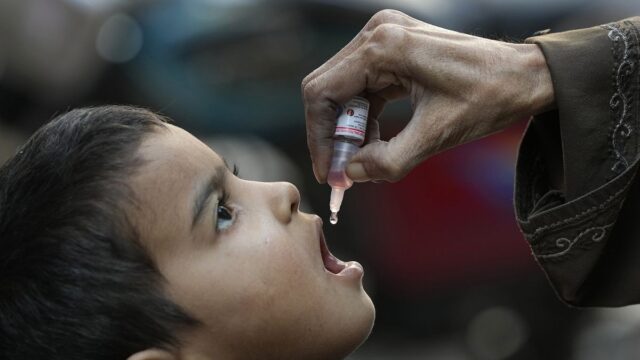Antonio Guterres says Gaza is in “humanitarian free fall” and calls for a pause in fighting so aid agencies can distribute 1.6 million doses of the nOPV2 polio vaccine in the strip.
Palestinian health authorities have reported first case of polio in a 10-month-old child unvaccinated in the Gazan city of Deir al-Balah. After discovering the child’s symptoms, tests were carried out in Amman, capital of Jordanand it was confirmed that it was polio, according to health authorities.
It is the first case of the disease in years to be recorded in the coastal enclave devastated by the war between Israel and Hamas since last October. This life-threatening and paralyzing disease It mainly affects children under five years of age and is usually spread through contaminated water. Pakistan and Afghanistan are the only countries where the spread of polio has never been stopped.
The UN calls for seven-day ceasefire pauses to vaccinate in the region
On Friday, the UN Secretary General, Antonio Guterreshe asked seven-day pauses in fighting to allow agencies to deploy a vaccination campaign throughout the strip.
“We know how an effective polio vaccination campaign should be administered. Given the widespread devastation in Gaza, it will take at least 95% vaccination coverage during each round of the two-round campaign to prevent the spread of polio and reduce its occurrence,” he said.
“I call on all parties to provide concrete guarantees immediately, guaranteeing humanitarian pauses to the campaign.”
Two rounds of polio vaccination are scheduled to be launched in late August and September in a attempt to prevent the spread of variant poliovirus type 2 (cVDPV2).
During each round of the campaign, the Palestinian Ministry of Health, in collaboration with the World Health Organization (WHO), the United Nations Children’s Fund (UNICEF), the United Nations Relief and Works Agency for Palestine Refugees in the Near East (UNRWA) and other partners, will manage two drops of the new type 2 oral polio vaccine (nOPV2) to more than 640,000 children under ten years of age.
More than 1.6 million doses of nOPV2, used to stop cVDPV2 transmissionwill be delivered to the Gaza Strip. The vaccines will be administered by 708 teams in hospitals, field hospitals and primary care centers in each municipality of the strip. Around 2,700 health workers, including mobile teams and community outreach workers, will support the administration in both rounds of the campaign.
Poliovirus was first detected in Gaza in July in environmental samples from Khan Younis and Deir al-Balah. The UN says Gaza has been polio-free for the past 25 years.
But polio is not the only health problem facing Gaza, where Palestinian health authorities say more than 40,000 people have died due to Israeli airstrikes and other attacks since the conflict broke out in October 2023.
Only 16 of Gaza’s 36 hospitals are now partially functioning and other medical services have been exhausted. Israeli forces have destroyed all of Gaza’s sewage treatment plants and 70% of its sewage pumps, according to Oxfam, meaning many streets in Gaza are flooded with water contaminated with untreated sewagebecoming a privileged environment for the spread of diseases. This is especially true during the hottest summer months, when mosquitoes and other insects and food spoils more quickly.
As a result of the conflict, the population of Gaza faces a increase in respiratory infectionsthe diarrheathe sarna and the licelas skin rashesthe chickenpox, the jaundice and the hepatitis Aamong other health problems that are unlikely to spread beyond Gaza because it is isolated from the rest of the region.







